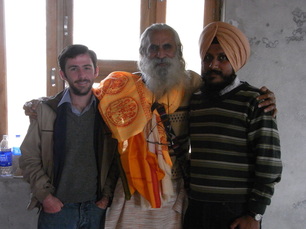Conducting Research with KVM: A PhD Student’s Perspective

Trent Brown from University of Wollongong, Australia
I spent two months with the Kheti Virasat Mission (KVM) from late 2009 to early 2010 as a part of my research for my doctoral thesis. My research focused on KVM as a social movement and aimed to explore the methods they are using to drive social, economic, political and ecological change.
What I found in KVM was a dynamic group of earnest and creative activists, exploring all of the possibilities that civil society has to offer. Recognising that the Green Revolution approach to agriculture has brought Punjab to a state of crisis, they see it as their urgent task to bring together all layers of society to sow the seeds for a bright new future for the state, based on the principles of justice and deep respect for nature.
At the centre of KVM’s activity is Mr. Umendra Dutt (known affectionately as Umendraji). Umendra ji started KVM in 2005 as a people’s movement, after having become dissatisfied with the dominant approaches to civil society action, which he felt had become money-driven and toothless. He saw the issues that were developing across the state – the rise in cancers, depletion of water and soil resources, the contamination of rivers, and so on – and recognised that these should be of concern to all Punjabis. Any approach to social organising to address these challenges would have to be holistic, dynamic and participatory.
Umendraji’s approach has been to involve people from diverse sections of society, according to the philosophy that every person can contribute to the movement in their own way, taking full advantage of their own position, talents, skills and opportunities. As Umendraji puts it, ‘a task for every person; a person for every task’. In practice, this has meant forging various ‘action groups’, mostly drawn along lines of profession, who focus their energies on creating change in specific areas.
During my time in Punjab I travelled from district to district, hearing the various initiatives taking place under KVM’s broad umbrella. Everywhere I went, from Chandigarh to Firozpur, Amritsar to Bathinda, I was greeted with great hospitality and generosity. People gave up their time to participate in interviews for my research, and spoke with enthusiasm about the work they were doing.
The central focus of all of this activity is the endeavour to promote natural farming among farmers. In the villages of Punjab the rates of cancer and reproductive health disorders are almost as high as the farmers’ debts. Many farmers are starting to see natural farming as an appealing alternative, as it requires less expenditure on inputs and allows them to safeguard their families from the various illnesses that are enveloping Punjab as a consequence of environmental toxicity. KVM has mobilised considerable energy and resources to help support farmers who have been willing to make this bold transition away from chemical agriculture. They provide them with the technical and moral support to try new techniques based on ecological principles.
Alongside this, KVM is facilitating a blossoming movement among the village women of Punjab. In many respects, women have been the worst hit by Punjab’s health crisis: Rates of cervical and ovarian cancers are especially high, and women are often given the task of caring for those who become afflicted with illness. Village women are now teaming up with KVM in order to confront this nightmare. They have contributed to the movement in various ways - by encouraging men in the villages to adopt natural farming, by growing their own vegetables for the family in kitchen gardens and by reviving traditional recipes involving nutritional ingredients like millets, in order to improve the diet and health of their communities.
Since people living in the cities are also consuming the food contaminated with chemical residues, it is equally important to bring the message of natural farming to them. As such, KVM has organised several action groups in the cities to raise awareness and change public attitudes. Particularly important is the Environmental Health Action Group, which consists of medical doctors, practitioners and public health experts who have spoken out against the health crisis enveloping the state. They are pushing a new research agenda to try to better understand and document the health problems of Punjab. They have also made efforts at informing the public of the organic connections between unhealthy ecosystems and unhealthy human beings.
KVM recognises the value of research and nurtures positive relations with students and academicians alike. They see a dual benefit to involving students in the movement: on the one hand, it sensitises a new generation to some of the most burning social and ecological issues of our time; on the other hand, it may give rise to research findings which can further contribute to their mission of creating a more safe and sustainable Punjab. Whether it is post-graduate students conducting independent research, interns or just friendly visitors, KVM is extending an open hand.
KVM is interested in forging collaborative relationships with students and researchers. They prioritise research which can be mutually beneficial. As the movement has diverse branches it also has diverse research needs. I would encourage all of those interested in conducting research with KVM to get in contact with relevant representatives in the early stages of formulating research questions and aims. Start a conversation about research into a more sustainable agriculture and sustainable Punjab. In that way, it will be possible to formulate research which not only contributes to the body of knowledge, but also can be of some practical use to those in the frontlines of social transformation.